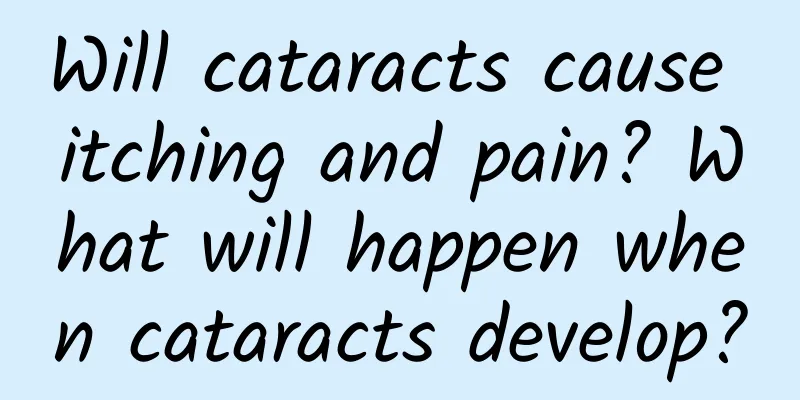Will cataracts cause itching and pain? What will happen when cataracts develop?

|
Cataract is an eye disease and the leading cause of blindness in the world. Most cataracts are caused by aging, also known as senile cataracts. There are also congenital cataracts and cataracts caused by trauma. So, will cataracts hurt your eyes? Can cataracts cause itching and pain in the eyes?It usually does not cause eye pain. Cataracts go through several stages during their development: the initial stage, the expansion stage, the maturity stage, and the post-maturity stage. Cataracts are a painless disease in the early stages, with symptoms of gradual vision loss and blurred vision. Some people may experience glare, and some may experience double vision. However, if the lens enters the expansion phase, it will compress the surrounding tissues, causing the circulation of aqueous humor in the eye to be blocked and leading to increased intraocular pressure, which will cause symptoms similar to glaucoma: high intraocular pressure, headache, and some patients may experience nausea and discomfort. If this problem occurs, it should be solved by surgery in a timely manner. What will happen if cataracts develop?Cataracts can be divided into four stages according to the course of the disease. 1. Initial stageDuring this period, the patient feels that everything he sees is a little foggy, as if it is foggy every day. When there is plenty of light, the vision is better, but when the light is dark, the vision is worse. 2. Expansion periodDuring this period, the water content of the lens increases, the lens expands, and the thickness increases, which may affect the circulation of aqueous humor and lead to increased intraocular pressure. The clinical manifestations are eye pain, decreased vision, conjunctival congestion, headache, nausea and other symptoms of glaucoma. At this time, if the patient goes to the hospital for examination, he may be misdiagnosed as glaucoma. Cataracts and glaucoma should be distinguished during this period of onset. If cataracts are confirmed, surgery should be performed in time. After the surgery, the intraocular pressure will return to normal and will not increase again. 3. MaturityDuring this period, the lens is dehydrated and the thickness of the lens returns to its previous thickness, but the turbidity increases and the patient's vision decreases significantly. The indications for surgery have been met and surgery can be performed. If surgery is chosen during this period, the postoperative recovery is relatively fast and the postoperative reaction is mild. 4. Overripe periodDuring this period, the lens has become completely cloudy and hard. If you choose surgery at this time, the difficulty of the operation will increase, the postoperative reaction will be more severe, and the recovery will be slow. How to prevent cataracts in daily lifeAdequate intake of vitamin A and carotenoids to maintain the health of the eyes and lens. Foods rich in vitamin A and carotenoids include animal liver, pumpkin, mango, papaya, kale, chrysanthemum, spinach, rapeseed, carrots, etc. Take more lutein, because it is a carotenoid, has an antioxidant effect, and can resist the damage of ultraviolet rays to the eyes. Foods rich in lutein include oranges, tomatoes, corn, pumpkin, papaya, sweet potatoes, broccoli, etc. You should drink more water on a daily basis. When the body lacks water, it is easy to produce abnormal chemicals, which damage the lens and increase the probability of cataracts. It is recommended to consume 2000~3000 ml of water every day. Supplement the intake of lutein, because it can protect the lens and reduce the probability of cataracts. The human body cannot synthesize lutein on its own and needs to be obtained from food. It can be obtained through fruits and vegetables such as corn, cucumber, pumpkin, bok choy, mustard greens, mango, orange, grapes, kiwi, etc. Eat more fresh fruits and vegetables. Fresh fruits and vegetables are rich in vitamin C and vitamin E, which can reduce the degree of oxidative damage to the lens. |
<<: When is the best time to divide peony? How to plant peony to achieve high survival rate
>>: Is presbyopia the same as cataract? How to relieve cataract and low vision?
Recommend
Why do I feel a dull pain in my left lower abdomen during early pregnancy?
After becoming pregnant, expectant mothers should...
Is it pregnancy if the period is delayed for 2 days?
Generally, women find out they are pregnant by ca...
Does milk leakage mean too much milk?
Milk leakage does not mean that you have too much...
What does cervical mucus look like?
Although the uterus is a key part of the female r...
What are the effects of uterine prolapse?
Uterine prolapse is very harmful to women. Genera...
What should I do if the outer side of my genitals is red and itchy?
A woman's private parts are really troublesom...
What to eat when you have menstrual pain
The most painful thing about being a woman is tho...
Why are there no live hairtails? Why are hairtails flat?
Hairtail is a fish of the family Ocellidae in the...
What does it mean when a woman dreams of eating a snake?
Snakes are very repugnant to many people. They ar...
The best time for pregnant women to eat bird's nest
Pregnant women should supplement more nutrients i...
Things to note when having sex the day before your period
Every female friend has a menstrual period every ...
40-year-old woman with knee pain
Once a person reaches middle-aged or old age, var...
What are the methods to regulate kidney yang deficiency in women?
Women's unique physiological mechanisms cause...
What are the dangers of drinking during menstruation? Be alert after reading
Women's bodies are more fragile during menstr...
Many areas have seen adult paralysis "soft disease", which was eventually confirmed to be related to this
I have obviously gotten enough sleep and eaten en...









